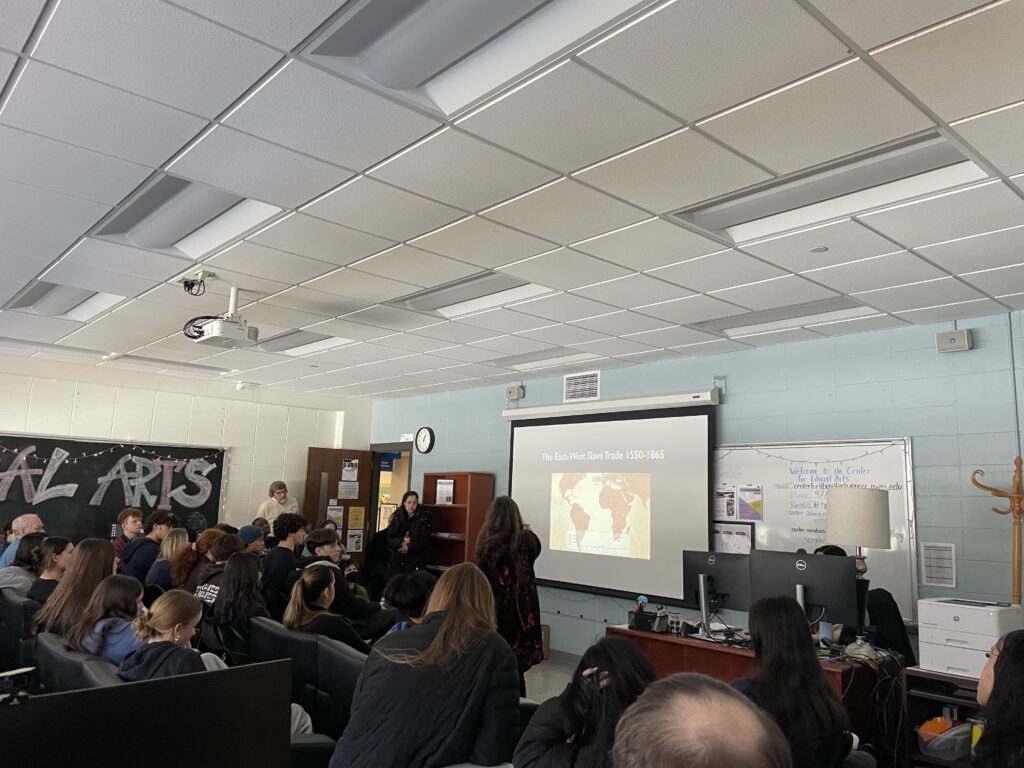NECC Celebrates Black History Month
Since 1976, February has been a global celebration of Black History Month. At Northern Essex Community College, students and faculty are devoting time to celebrating the achievements and contributions of Black Americans throughout history. They are hosting a variety of events and programs to honor this important observance and help educate our community.
The events began on Wednesday, February 5 as the Center for Liberal Arts hosted a “Unerasing Black History” discussion presented by History Professor Steve Russell and Global Studies Chair Meredith Gunning.

It was standing-room-only as students, faculty, and staff attended the “Unerasing Black History” discussion.
Several of Professor Russell’s and Professor Gunning’s students attended this event, alongside an NECC librarian, a sociology professor, and a psychology professor.
Professor Russell began the presentation by discussing the importance of understanding “how fundamental African American labor was to building the United States of America’s modern global economic systems,” said Russell. He touched upon New England’s economy in the 18th century, specifically the “transportation of goods,” such as lumber and agricultural products produced by Black Americans, noting the essential role that played in the American economy.
A handful of students provided their thoughts on Black Americans’ impact on the U.S. economy, which transitioned into a deeper discussion of the enhancement of the 19th century when the significance of cotton and textile mills also contributed to the economy.
After questions and answers were exchanged between Russell and students, Professor Gunning took the floor.
Gunning began her presentation by having students compare and contrast the past to the modern day to comprehend the importance of how to “tackle problems of today [one must understand] past mistakes,” said Gunning.
Gunning examined the history of literature and thought it would be best to “look in our own backyard” in Boston during the Transatlantic Slave Trade, said Gunning.
According to Slavery and Remembrance, a website overseen by the United Nations Educational Scientific and Cultural Organization, “The transatlantic slave trade was an oceanic trade in African men, women, and children which lasted from the mid-sixteenth century until the 1860s.”
As a result of doing her own research about the transatlantic slave trade, Gunning wanted to put “names to faces” and honor a specific and historical slave: Phillis Wheatley, said Gunning. In 1761 Wheatley was kidnapped in Gambia, a country in West Africa. According to the National Women’s History Museum’s website, Wheatley was brought to America and “sold to the Wheatley family in Boston, Massachusetts.” During her enslavement under the Wheatley family, she was taught to read, write, and comprehend the English language. A few years later, Wheatley explored the world of poetry and writing, which led her to become “the first Black African woman to have poetry published in America,” said Gunning.
For the remainder of the event, students and faculty shared their thoughts on the importance of celebrating Black history and the significance it continues to have on America.
Wednesday’s event was the first in a series of talks, workshops, and celebrations of Black History this month. For a complete listing, visit the webpage.







